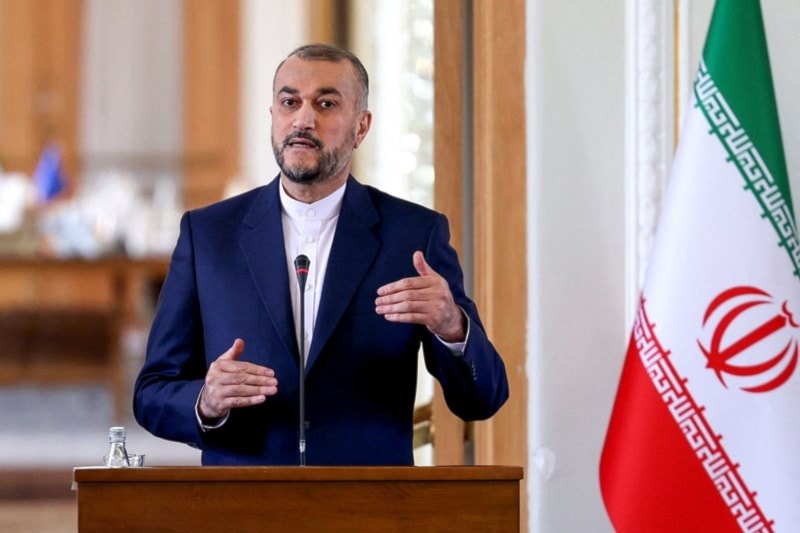Biden-Netanyahu cooperation 'root' of regional insecurity: Iranian FM
Iran's top diplomat tells CNBC that the IRGC strikes this week are legitimate self-defense in line with protecting the country's national security.
-

Iran’s Foreign Minister Hossein Amir-Abdollahian during a press conference in 2023 (AP)
The United States' full support for the Israeli occupation is the "root" of instability and insecurity in the region, Iranian Foreign Minister Hossein Amir-Abdollahian said on Wednesday.
Talking to CNBC’s Dan Murphy on the sidelines of the World Economic Forum in Davos, Iran's top diplomat warned that the US and President Joe Biden "should not tie his destiny to the fate of Netanyahu," referring to the latter's dwindling political future.
Read more: 'Israel', US already lost the war in Gaza: The Hill
Washington has declared unwavering backing of "Israel" since day one of the war on Gaza, which crossed its 100th-day mark this week.
Including political support, both through statements and vetos at the UN, the US established an air corridor to provide daily weapons and equipment to the occupation entity to use in its war on the Strip. The assistance also included hefty financial payouts worth billions of dollars so far.
In its latest report, the Palestinian Health Ministry in Gaza stated that the number of martyrs in the Israeli aggression on Gaza surpassed 24,000, with over 60,000 wounded.
“The full-scale cooperation of Biden and the White House with thugs like Netanyahu in Israel is the root of insecurity in the region,” Amir-Abdollahian added.
Yemen's operations sovereign
Commenting on the situation in the Red Sea, the Foreign Minister said Iran wants Washington to "stop the war in Gaza," emphasizing that the strategic waterway is important to the Islamic Republic.
Last November, the Yemeni Armed Forces announced a ban on Israeli-owned or affiliated ships, as well as ships heading toward the occupation entity, from crossing through the Red and Arabian seas.
Washington and some of its allies have accused Iran of being behind the Yemeni decision to carry out the operations.
Read more: Ships in Red Sea distinguishing themselves from Israeli vessels
Sanaa stressed that all other ships are safe and free to navigate in the passageways and that it will stop its operations once the war on Gaza stops and sufficient food and medicine is delivered to the Strip's people.
Since then, the Yemeni army conducted a significant number of operations against banned vessels, the last of which was on Tuesday, when the group struck and hit a ship sailing toward the occupation entity via the Red Sea.
However, these operations were strongly objected to by the United States and some of its allies.
Last week, the US and UK launched a series of aggressions against Yemen, stating that they are in response to Yemen's operations.
Meanwhile, Sanaa vowed retaliation against naval assets belonging to both countries.
Read more: Yemen reiterates shipping safety in Red Sea amid US propaganda
“The people of Yemen and other countries in the region who defend the Palestinian people are acting according to their own experience and through their own interests, and they are not receiving any orders or instructions from us,” Amir-Abdollahian said.
Maritime security is vital to Iran as an exporter of oil, "so if there is insecurity near our vicinity, it will not be in our favor," he added.
“We believe that any action to destabilize the region is rooted in Israel and its genocide in Gaza," he continued.
Legitimate self-defense
On Monday evening, the Iranian Revolution Guards Corps (IRGC) announced carrying out multiple strikes, using ballistic missiles and drones, on terrorist targets in Syria and Mossad headquarters in Iraqi Kurdistan's Erbil.
Then, in a later statement on Tuesday, it revealed another strike on strongholds belonging to Jaish ul-Adl in Pakistan, a group designated as "terrorist" by Iran.
According to Iranian media, the operation came after long years of communicating with several regional governments regarding terrorist attacks targeting Iran that were originating from their countries, including Iraq.
On its part, the IRGC announced the strikes were in response to the terrorist explosions against civilians in Kerman, which resulted in the martyrdom of around 100 people, and the assassination of senior IRGC and Resistance leaders.
However, the operations saw heavy protests from Pakistan and Iraq, who announced a series of diplomatic measures against Iran in response.
Amir-Abdollahian said the strikes are “in line with combating terrorism and legitimate self-defense.”
“We have no reservations when it comes to securing our national interest with any other country."

 4 Min Read
4 Min Read








